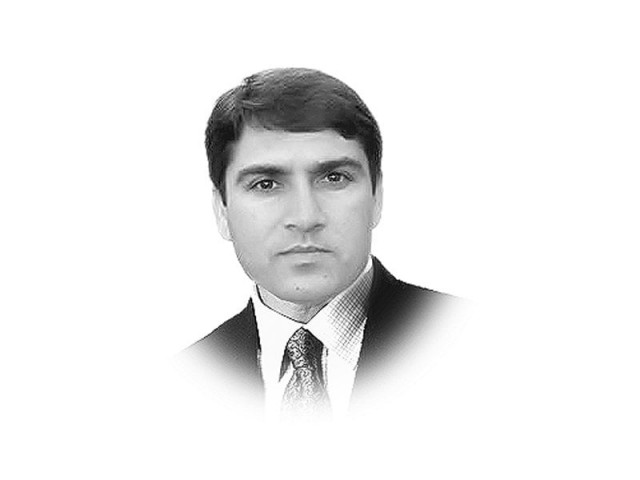Peace, security and adhocism
Pakistan needs to engage in constructive and meaningful dialogue with Afghanistan

The writer works as senior editor with the Pashto language Mashaal Radio. The views expressed here are his own
While the carnage at the shrine of Sufi saint Lal Shahbaz Qalandar in Sehwan, once known to be ‘Sivistan’ for being the city of Hindu god ‘Lord Shiva’, is brutal and tragic, the attack carried out in the heart of Lahore, known to be the heart of Pakistan besides power base of the ruling family, is worrisome.
Irrespective of who carried out the terrorist act, the most distressing aspect is that the city witnessed such killing for the second time in less than a year. Over 70 people, mostly Christians, were killed when a suicide bomber targeted Gulshan-e-Iqbal Park on Easter evening.
The bombing ensued a flurry of meetings, high-level security briefings, inquiries and combing operations across Punjab that overshadowed everything else in the local media till the dust settled down in the next few days and normalcy returned to everyday life in the country.
Since the 9/11 terrorist attacks in the United States followed by the Operation Enduring Freedom toppling the Taliban regime in Kabul, the three provincial capitals have been witnessing a degree of violence relating to a host of Taliban groups and their al Qaeda affiliates. But the city of Lahore or other major cities in Punjab province remained relatively calm.
Now call it sagacity of the ruling party whose chief minister once made a sympathetic appeal to the Taliban to spare Punjab because his government opposed Musharraf’s policies and ‘rejected dictation from abroad’, or its long distance from the lawless tribal areas, that its major cities remained safe while (mostly) Peshawar and the cities of Quetta and Karachi were bearing the brunt of everyday bomb attacks.
But being calm does not mean secure and peaceful. Being the birthplace of sectarianism, home to the Punjabi Taliban and several jihadi networks, and playing turf of firebrand religious leaders, one cannot close eyes in face of threat as visible as violent extremism in the province.

It has been 18 months since Punjab lost one of its finest sons to that monster. Shuja Khanzada, the outspoken home minister of the province, was targeted in his home town of Shadi Khan, Attock, by two suicide bombers on August 16, 2015. Investigators suspected footprints of Lashkar-e-Jhangvi, the sectarian outfit whose chief Malik Muhammad Ishaq was killed along with his two sons and 11 other ‘attackers’ in an alleged police encounter just three weeks ago.
Additionally, it was not long ago that Maulana Abdul Aziz, the chief cleric of Lal Masjid in Islamabad, told this newspaper in an interview that he had no repentance over supporting the so-called Islamic State (IS). And the federal government, instead of legally and forcefully stopping him from ‘hate speech’, chocked the mobile-phone signals in Islamabad for two consecutive Fridays in February 2016 to stop his weekly sermon via cellular phone.
Apart from other key points, restrictions on hate speech, registration of religious seminaries and their funding sources were part of the National Action Plan (NAP) agreed upon by all political and religious parties in the aftermath of terrorist attack on Army Public School in Peshawar. Cannot the federal government stop Mr Aziz under that clause?
In yet another example of inaction and appeasement, the government of Khyber-Pakhtunkhwa, where militants brutally slaughtered APS children in December 2015, granted $3 million to the Darul Uloom Haqqania of Maulana Samiul Haq, who once proudly called himself father of the Taliban. Can someone ask the K-P government what reforms have so far been brought in Haqqania curriculum or did the seminary agree to open its accounts for audit? Will the madrassa openly condemn attacks targeting civilians?
The abrupt escalation of violence in various parts of the country during the past three weeks and the claims of responsibility by groups such as the TTP, IS and JuA is a proof that the Taliban and affiliates are in the process of regrouping their forces and the scourge of terror is yet to be fully eliminated. This is no time for foot-dragging, blame game or political expediencies.
Internally, the National Action Plan is a comprehensive road map on how to deal with terrorism and all kinds of extremism. There is no window, whatsoever, for political expediencies or likes and dislikes on the basis of being good or bad.
Externally, Pakistan needs to engage in constructive and meaningful dialogue with Afghanistan. An end to the proxy game, be that the Taliban, Haqqani Network, TTP, IS or Jamatul Ahrar, must be the end point. This may not be that simple. But certainly simpler and less painful than shouldering the dead bodies of innocent people on either side after each bloodbath.
The single lesson, if any, learnt from the past more than three decades of jihadism in the region could be the fly-by-night nature of jihadist proxies. Tasting the power of gun and gunpowder, jihadis dislike all stopping them from pressing the trigger, be that Afghans, Pakistanis or Indians.
Published in The Express Tribune, February 21st, 2017.
Like Opinion & Editorial on Facebook, follow @ETOpEd on Twitter to receive all updates on all our daily pieces.















COMMENTS
Comments are moderated and generally will be posted if they are on-topic and not abusive.
For more information, please see our Comments FAQ